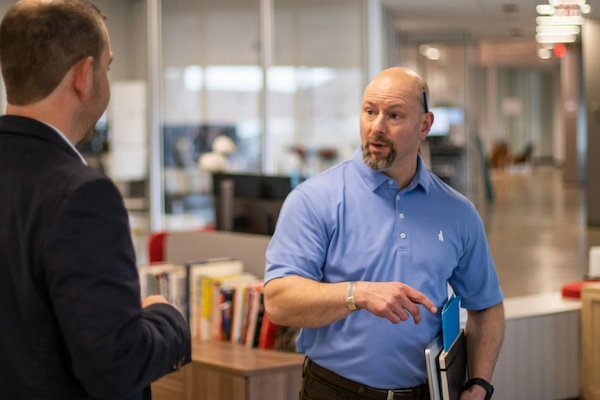
Photo by Clayton Cardinalli on unsplash.com
Written by Frank Lopez
More people, especially those in younger demographics, want to know the businesses and companies they buy from have missions and ethics that align with their own.
Workers also seek companies whose missions extend beyond making money. They also want shared values, behaviors and standards in the workplace. They want to be cared for and treated as individuals.
This trend is not only happening in office spaces or retail, but in every sector — including manufacturers.
The San Joaquin Valley Manufacturing Alliance’s “Valley Made” summit next month will feature as its keynote speaker Dr. Matt Poepsel, author of “Expand the Circle: Enlightened Leadership for our New World of Work,” and host of the “Lead the People” podcast.
He also serves as president and “Godfather of Talent Optimization” at the Predictive Index, which offers talent optimization software, workshops and expert consulting.

Poepsel is a part-time faculty member at Boston College, teaching graduate courses in the areas of leadership and business spirituality.
In his keynote speech, “Optimal Output: Uniting Production, People, and Potential,” Poepsel cover the most common reasons manufacturers fail to realize their full potential, and the shifts in mindset and execution needed to reach higher levels of value creation.
Poepsel said that spirituality does not have a set definition, as it could be different for every individual, but along with some religiosity, it also involves beliefs and behaviors of being connected with other people, with nature, and whatever is beyond the human domain of understanding.
Though these concepts have been in the workplace for decades, workers are in a very different world after the Covid-19 pandemic. Poepsel said religiosity has been trending downwards for years, along with community involvement.
“A lot of the old institutions have fallen away, and people are expressing this need and interest in something bigger than themselves. Language around belonging and purpose and meaning has really entered the workplace,” Poepsel said.
He noted that Gen-Z workers, those born between 1997 and 2012, will look for those attributes in an employer over the compensation in many cases, which can be shocking to older generations.
While millennials in the workforce, those born between 1981 and 1996, were really keen on sustainability and the green movement, Gen Z was more concerned about inclusion and social causes.
“Employers now are finding themselves with a workforce that is presenting these spiritual interests in a way that hasn’t been done before,” Poepsel said.
According to a study by the Religious Freedom and Business Foundation measuring the Fortune 500’s commitment to workplace religious inclusion, some of top ranking manufacturers included Dell, Intel, Tyson Foods, Bosch and Rolls-Royce.
He said that levels of employee engagement are lower than before, burn out levels are higher, more people are facing tough mental health challenges, and more people are feeling isolated and alone in a remote, online world that is unsatisfying in many ways.
Poepsel noticed that manufacturers that are recognized for implementing business spirituality practices stress inclusion of all faiths and spiritualities, as well as non-religious people and various world views.
Manufacturers are now realizing the importance of Diversity, Equity, and Inclusion (DEI) in the workplace, Poepsel said, and larger companies such as Texas Instruments provide faith-based employee resource groups.
This option allows workers who want to come together to meet with unlike minded people to exchange ideas and learn about one another’s faiths, cultures, and traditions with an appreciative mentality.
“It creates tighter bonds in the workforce and fulfills our needs for affiliation and belonging. That can boost employee engagement and boost productivity,” Poepsel.
It can also help with efficiency and retainment levels.
He said more companies are trying to make sure that they’re doing good while doing well and trying to use business as a force for good.
The SJVMA’s 9th annual summit will take place on Oct. 30 at the Fresno Convention Center Exhibit Hall.








